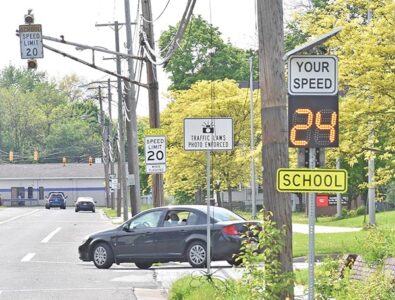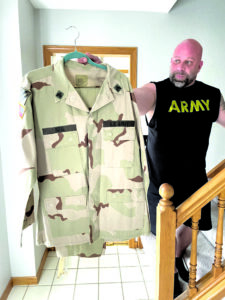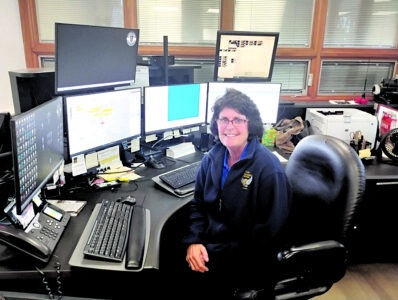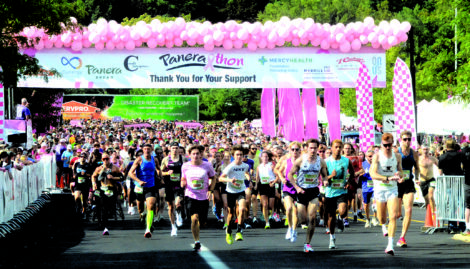Youngstown speed-camera court leaves some happy, some not

Staff photo / Ed Runyan This is a speed camera along Williamson Avenue in Youngstown near the Rayen Early College Middle School.
YOUNGSTOWN — Of course, nobody likes getting a speed-camera ticket in the mail. But at least since January, an appeal process has been in place through Youngstown Municipal Court.
The court, which is run by Youngstown Municipal Court Magistrate Donna McCollum, has been holding speed-camera hearings the second Thursday of every month since January. The Vindicator sat through hearings last week and saw cases that resolved happily, not happily and somewhere in between.
Youngstown’s speed-camera program, which uses cameras and ticket processing by the company Blue Line Solutions, has been back in operation since September, only in school zones.
The program has issued 25,309 tickets since September, according to the Youngstown Municipal Court Clerk of Courts office. Of those, about 100 cases have been appealed. About 30 cases were set for a hearing May 8, but only a handful resulted in someone standing before the magistrate in an effort to get the ticket dismissed or the cost reduced.
Before any hearings took place that day, McCollum met with the 15 or so people who arrived for the 4 p.m. start of court to explain how things work. Hearings are scheduled to go until 6 p.m., but they were over sooner than that on May 8.
“The tickets you received through the citation show where it occurred, the time, the speed alleged, the license plate and the state the license was issued in,” McCollum said. “That’s what is called a prima facie case. Unless you have some proof that that camera was faulty or that you were not driving the vehicle, you cannot really argue these tickets,” she said. “That is the way the statute is set up.”
She explained the ticket goes to the owner of the car, but the owner can fill out a form to identify the person who was actually driving at the time of the ticket. Then that person gets a court date, but the owner also has to attend.
“The penalties for these offenses are set by statute,” she said. “We don’t set them. Court costs are $150. And that is in addition to the fine imposed,” she said. “Your fine can range anywhere from $100 to $150. So if you get the maximum fine, you could walk out of here owing $300.”
The money owed for a ticket is sent to Blue Line Solutions, which pays the Youngstown Municipal Court Clerk of Courts office a certain amount and the city a certain amount, McCollum said.
“This court gets no money for this. It is not a money maker for us. That’s what people think. That is not accurate,” she said. No points are assessed on a person’s license.
“If a fine and costs are imposed, and you don’t pay it, the city of Youngstown can come after you in a civil proceeding to try to collect that money,” she said.
She explained that before the person stands before the judge, he or she will meet with a Youngstown assistant prosecutor to discuss his or her case and potentially reach a plea agreement.
“They may offer you a reduced ticket amount. They may offer you reduced court costs,” McCollum said. “That is completely up to you. Please know that is like a one-time offer. Tell me anything you want to tell me. However, if I say that’s all fine and good, here’s your fine and court costs, you don’t get to go back and say ‘Oh. I want to take it back.’ It’s too late,” she said.
“After talking to a prosecutor, you will be brought into the courtroom with a prosecutor, who will explain to me whatever resolution you have resolved this matter to be,” she said. The person with the ticket can ask either the prosecutor or the judge questions the day of the hearing, she said.
McCollum said she reviews the tickets before the hearing date. She said that is when she sometimes dismisses tickets if they were issued outside of the posted school-zone times or there was no school that day.
“That’s about the only way to get out of these tickets,” she said. “I don’t like them any more than any of you do, but I’m sworn to uphold the law. And this is the law at this time.”
HEARING DAY
The first hearing on May 8 started out on a positive note. A young man sat in the courtroom with his mother, Tracy Lynch, before the hearing started. She advised him he needed to slow down in his driving. “Needless to say, that’s a school zone. And sometimes there are little kids that pop out,” she told him.
When it was time for their hearing, she stood before the magistrate, and Youngstown Assistant Prosecutor Shaina Rocheford explained that Lynch was contesting whether the flashers were on at the time of her son’s alleged speeding infraction.
Rocheford said the Youngstown Police Department keeps a log that documents each of the times that a Youngstown police officer travels to each of the speed-camera locations to check each day to ensure the lights are flashing to indicate that the 20-mile-per-hour speed limit is in effect.
Rocheford explained, however, that in the case of Lynch’s ticket, “Unfortunately our log does not go back to October, when this incident occurred. Our logs start in November. Therefore I cannot verify whether the (camera) was working at that time. For that reason, I am moving to dismiss this case, Your Honor,” Rocheford said. The case was dismissed.
IT’S COMPLICATED
The next case was far from simple or happy.
It involved a woman and man who were there to challenge several speed-camera tickets. The man said the woman was the driver, but the car was in both of their names. The man said he and Youngstown Assistant Prosecutor Joe Fritz were unable to reach a plea agreement because Fritz would not reduce the $150 in court costs in each case.
The man said he wanted to take the case to trial.
“I told him I am willing to pay whatever it is just as long as we are not paying court costs for like four or five separate cases,” the man said.
McCollum said the court costs were being levied on each case because the tickets were issued at different times. Fritz said he had made a “final offer.” He told the judge he would dismiss one of the five cases “in full.” On another, the fine would be suspended and the man would pay court costs of $150. On the next one, a $25 fine and $150 in court costs. On the next one, a $50 fine and $150 in court costs. On the next one, a $25 fine and $150 in court costs.
The man said of the $700 total, “I don’t know how I am going to come up with that,” but the judge told him he would not be “paying it today.” The funds are paid later to Blue Line Solutions. Fritz said Blue Line Solutions has payment plans.
The man said the $700 is the equivalent of two weeks’ pay. The judge asked what school zone was involved, and he said Wick Avenue. McCollum told the man, “You are going to have a trial tonight. If you choose not to accept this offer, which is your right, you are going to have a trial right now,” she said.
McCollum said she did not know what evidence the man had. “Right now I do not have any evidence,” he said.
“That’s why you are here today is for the trial,” McCollum said. He tried to negotiate a lower cost with the judge, and she advised him that is done with the prosecutor, not her. Fritz said he had already reduced various costs and fines. “I’m going to be steadfast at this point,” Fritz said. McCollum told the man that without any evidence, she would find him guilty on all five tickets.
The man tried again to get a lower cost. Then he asked to reset the case so he could “request information about the cameras and things like that, to see what we would come up with.”
McCollum noted that “The court has already taken testimony” months earlier “about the reliability of the cameras, the law involving the cameras, and the court has accepted that. So that is not something that can be argued or something the court will take argument with.”
McCollum said other tickets were written to other drivers in the same time frame as this man’s tickets, “so the camera was, in fact, operable.” The man let out a big sigh and spoke to the woman with him, then said, “If you are not able to give me time, then that’s the only option I have is to accept the deal.” He accepted the terms that had been offered.
COMPANY OWNER
The next ticket challenge was for a company. The owner appeared for the hearing. Rocheford explained that the owner indicated that multiple people drive his vehicles. He thinks he knows who was driving but does not have an address for the person.
The man said he has an address, but the person no longer lives at that address. McCollum explained that if a good address cannot be found, “It’s going to fall back on you as the owner.” McCollum gave the man time to file a form to transfer the liability to the person who was driving and then reschedule a hearing.
PROFESSIONAL DRIVER
A woman appeared for her hearing, and Fritz said she drives for a living and does not always drive in the Youngstown area. Her plea agreement was for paying the $150 in court costs but no fine, and that is the deal she took.
Charles Kettering appeared on a ticket that alleged he was driving 43 mph in a 20 mph zone. Rocheford said it happened in October. “He indicated his wife has Alzheimer’s, and sometimes there are a lot of distractions in the car when he is driving,” Rocheford said. Said was offering Kettering a $25 fine and $75 in court costs. A deal was struck.
The final case involved a woman. Fritz said her plea agreement was for her to pay $150 in court costs but no fine, and the judge agreed.
EARLIER SPEED CAMS
According to Vindicator files, the city’s school-zone speed cameras began Feb. 21, 2023. They were turned off between May 18 and June 2, 2023, when classes in the schools ended for the year. The cameras were supposed to be turned back on Sept. 18, 2023, when classes began in Youngstown after a nearly one-month teacher strike was resolved.
But that didn’t happen because of a disagreement between the city administration and the courts, leading to the cameras not being in use for more than a year. The issue was how appeals of speed citations would be handled.
The two sides came to an agreement that was finalized Aug. 21, 2024, during a meeting between representatives from municipal court, the clerk of courts office, the police department, the city law department and Blue Line Solutions of Chattanooga, Tenn.
Under the agreement between the city and Blue Solutions, Blue Line receives 35% of the money generated by the tickets, and the city gets the other 65%.
COURT ADMINISTRATOR
Youngstown Municipal Court administrator David Magura Jr. said getting the process in place to handle appeals was challenging because there really wasn’t much of a template in the area to emulate.
Girard has a speed-camera program, but it is different from the one in Youngstown in that it is not just in school zones, and it uses officers holding speed cameras instead of the fixed cameras used in Youngstown school zones.
One similarity is that the Girard Police Department also works with Blue Line Solutions, so that has helped make Youngstown’s speed-camera court transition easier to learn from, Magura said.
“It took us a while to get here,” Magura said of working out the details of setting up Youngstown’s speed-camera court. “It was a definite lift, but the process is getting refined. There was a learning curve, but it’s working pretty well.”
He said Individuals can pay their speed-camera ticket without having to appear in court. The court is for those who want to challenge the ticket. Magura said some people bring an attorney to their hearing to assist them, but most handle it alone.




